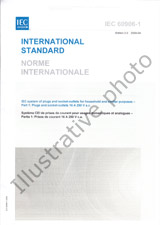We need your consent to use the individual data so that you can see information about your interests, among other things. Click "OK" to give your consent.

IEC/SRD 63476-1-ed.1.0
Smart city system ontology - Part 1: Gap analysis
Translate name
STANDARD published on 12.7.2024
The information about the standard:
Designation standards: IEC/SRD 63476-1-ed.1.0
Publication date standards: 12.7.2024
SKU: NS-1189445
Approximate weight : 300 g (0.66 lbs)
Country: International technical standard
Category: Technical standards IEC
The category - similar standards:
Annotation of standard text IEC/SRD 63476-1-ed.1.0 :
IEC SRD 63476-1:2024 provides a gap analysis on ontology relevant standards for smart city systems to be used as a base document for mapping, developing and maintaining a set of ontology standards for smart city systems. Ontology is becoming a key subject in the world of big data, AI, IoT, and smart city system standards. The following benefits of ontology are recognized as important with respect to interoperability, connectivity, traceability of digital content, particularly machine readability, executability and interpretability of digital content for decision making and actions. - Increase interoperability across domains. - Enable machine-readable code for computational reasoning and decision making. - Create semantic linkages between data, information and knowledge systems. - Build accessible APIs and semantic linkages between web-based data objects. - Link data domains with shared concepts or canonical data models. - Connect shared data concepts and definitions between domains. However, ontology has a variety of definitions in different international standards. How to understand different meanings of ontology and select the right definition for the right stakeholders’ concerns for the right purposes is a big challenge for effective integration of business, data, information, knowledge and decision making, across disciplines, domains, systems, platforms and applications in smart cites. Moreover, how to deal with the grand challenges of interoperability of many and various ontologies to satisfy the demands from artificial intelligence and big data analytics are gaps to be filled in the area of smart city systems. How to develop digital content that is machine readable, executable and interpretable, working in the system without human effort for a smart city system are emerging needs to be studied. There are significant demands for better communication, coordination, cooperation, collaboration and connectivity of existing ontology standards to smart cities practical sectors. This document aims: • to identify existing ontology standards from different Standards Development Organizations (SDOs) and to provide best practice examples and considerations of ontology standards development and maintenance for smart city systems; • to identify gaps in existing ontology standards for smart city systems and the opportunities and challenges in ontology standards development taking into account multi-dimensional and muti-domain stakeholders’ concerns city wide, and to provide recommendations for ontology standards development and maintenance to enable integration, interoperability, efficiency and effectiveness of smart city systems.
We recommend:
Updating of laws
Do you want to be sure about the validity of used regulations?
We offer you a solution so that you could use valid and updated legislative regulations.
Would you like to get more information? Look at this page.



 Cookies
Cookies
